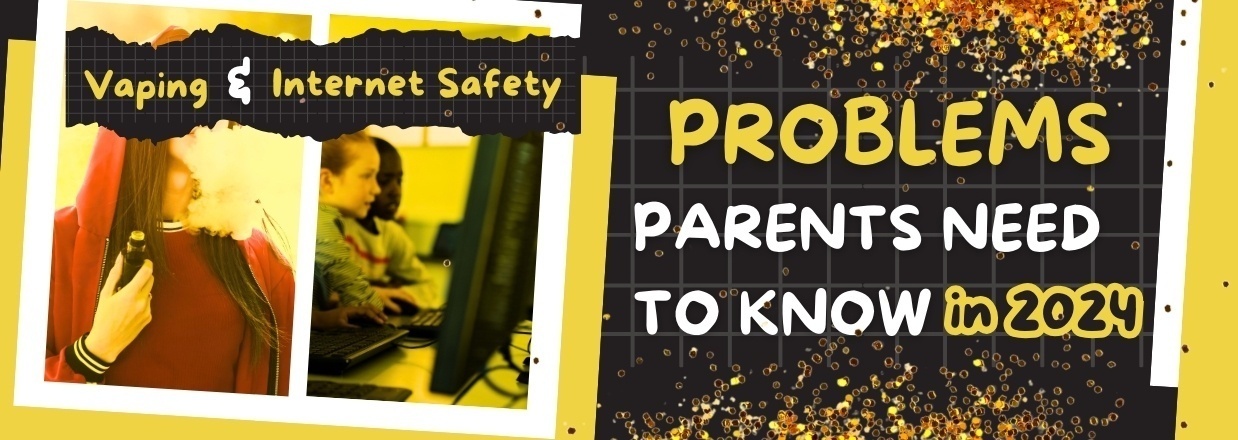Problems Parents Need To Know In 2024: Internet Safety and Vaping
Article Content
This is a condensed summary of a 2-hour long presentation at a local Middle School in our district, given Wednesday evening. Aptly called, Empowering Parents: Safeguarding Our Kids Online and Offline.
As a digital marketing professional, I wanted to get a headstart for my husband and I, for when our 5 year old daughter becomes an Internet user. Here we go!
Problem #1: Vaping Rising
First up was School Resource Officer Sonny London with the Village of Tinley Park, whose presentation was on a problem he’s observed is getting worse. A little something called ‘vaping’, or e-cigarettes.
Officer London shared that he started seeing vaping appear in schools as early as 2014 and now he’s seeing it in Middle Schools. On a semi-bright note, presciption drugs and street drugs aren’t as prevalent.
One parent asked what the youngest age of student he’d seen vaping, and London estimated about 12-13 years old.
The reason vaping is beginning to pop up in Middle Schools lies in the way they’re being marketed. Vaping isn’t just drug paraphenalia for hard substances, they can be used to disemenate flavors to a user. And these novel flavor alternatives are being marketed like juice and candy (a young kid’s bread and butter). The idea of inhaling a juice makes a young person think vaping is cool and safe, when in fact the elements used in e-cigarettes, for emitting those flavored vapors are hard and not so innocent.
How are Middle Schoolers getting e-cigarettes? Businesses breaking Tinley Park Ordinance 132.66, (selling to minors). E-cigarettes are deemed paraphenalia in most states.
To try to curb the selling to minors, police are sending 2-4 groups of teens (along with an undercover police officer) every quarter, to go under cover to see which places will sell to someone under 21. Sadly, the businesses being fined isn’t stopping them from selling e-cigarettes to minors again. The fine amounts are no where near enough to dissuade or scare them apparently. And in some cases, students whose parents own a business that carries e-cigarettes are selling e-cigarettes to their classmates.
London also revealed that there are now special detectors that can detect e-cigarette fumes being rotated through the schools, which have revealed some pretty creative hiding spots.
London also went over some current slang for vaping (which are ever changing), as well as brands and behaviors he typically sees from students trying to hide vaping in school.
E-cigarettes are not a safer alternative to cigarettes, if anything they are a potential gateway to other things he said. Especially when overused, their potential health problems can be devastating. Popcorn lung for example is one of those effects.
He encouraged parents to keep an eye out for vaping— “It is ok to go through their stuff.” And he emphasized “a lot of parents want to be their child’s best friend and it’s actually hurting their child in the long run.”
1st offenses of being caught with e-cigarettes, or vaping, is a student meeting with their school dean and getting suspended. Sometimes suspension isn’t needed, depending on the student’s cooperation. If serious substances like THC are found with the e-cigarette, then the consequence becomes more serious and the offense may be commuted to the police level. However, London stressed that the schools and resource officers try to not let things reach that. The reason is being to protect students from ruining the beginnings of their future. School is a place for making mistakes he said, and being able to learn from them in a private and impactful way.
Problem #2: Online Safety
Closing out the evening were Tinley Park Police Detectives Justin Rzeszutko and Vince van Schouwen, who were a hoot. The presentation that these two 30-somethings gave was both entertaining and hard-hitting. With tough subjects, this is a good approach to presenting.
Social Media is one online safety terrain that continues to cause headaches. TikTok being the top app with kids right now. In the eyes of young people today, Facebook is for old people now.
Both detectives stressed that the Internet isn’t going away, it’s a part of regular life so the reality for parents is to create a family technology management plan. And a big part of safeguarding their online use is monitoring technology usage, going over expectations, rules, and safety early with children. At the core, these need to be defined for kids at home:
- WHO can they communicate with online.
- WHAT technology devices they can have.
- WHERE they can visit online.
- WHEN they can use devices.
- HOW to figure out who and what to share (practice scenarios).
- WHY setting boundaries are important.
The big tips they recommended parents and guardians stress to their kids are:
- Never share your password with anyone, with the rare exception of a trusted parent or guardian.
- Turn GPS OFF on all apps.
Monitoring device use with software was mentioned as an option (such as Life360), but should not be something parents rely on like auto-pilot. This echoed London’s earlier statement of it being a parent’s right to go through their kid’s stuff. One comeback they said to use was, “Technology is a privelege, not a right.”
In manually monitoring device and online use, look for apps like Scout, Whisper, MeetMe, Kik, and a secondary Calculator app (which is a secret vault app) they said. They also said to key an eye on a a chat app that gamers tend to use called Discord. I raised my hand asking about Roblox and a nice Gen-X dad knew what I was talking about, and shared that it’s safe if chatting is disabled when kids are playing on the platform.
One topic that the detectives also stressed the importance of parents discussing is called, sextortion. For reporting sextortion, they cited a website called takeitdown.ncme.org.
For reporting missing kids: missingkids.org.
Since 1998, the The National Internet Crimes Against Children (ICAC) Task Force Program has been the key resource for reporting missing and exploited children, and they cited that during COVID, tips received skyrocketed.
As much as law enforcement tries to get warrants to be able to help victims of bullying, abuse, sextortion, hacks, and scams—it is especially hard to get cooperation from apps and companies based overseas. But, in exigent circumstances, law enforcement will intervene and do what’s right in the meantime.
In Summary
Don’t be afraid to be disliked by your kid for protecting them and teaching them. When in doubt, reach out to experts like local law enforcement and the appropriate personnel at your child’s school. And talk with other parents—everyone knows something you don’t and in comparing notes, we can win the battle of worrying about our kids.


0 comments